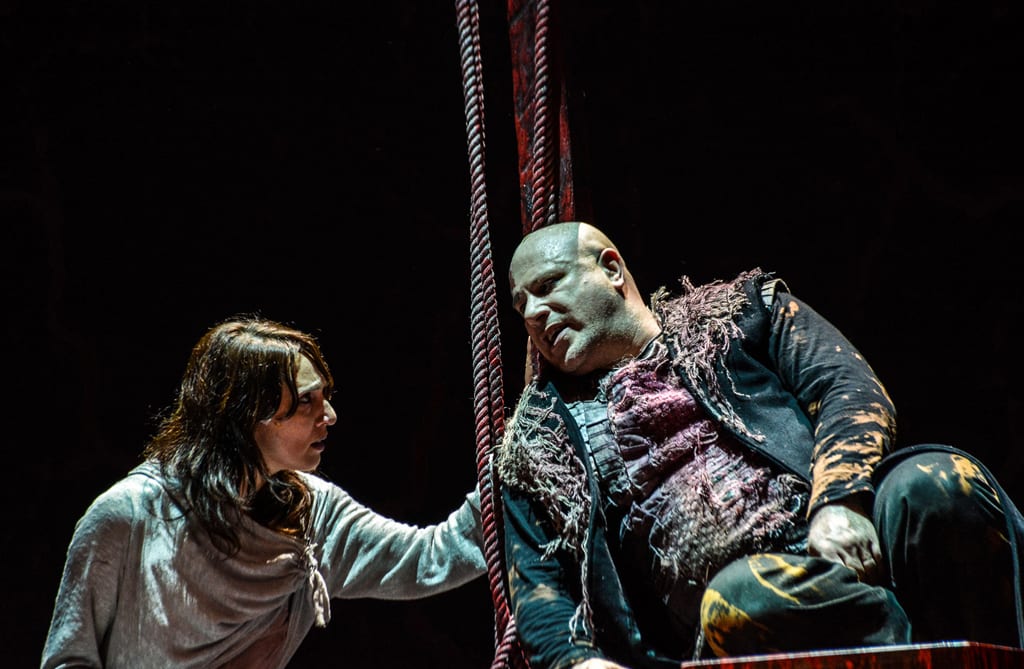The excellence of Macbeth is in how indelibly it marks the tragic course of the evil inherent in the human soul, of the inexorable progress flowing from the violation of moral laws, through periods of ambiguity, ultimately to the destruction it causes. This readaptation by Vincenzo Pirrotta seems very bitter, even cruel, but is in its way a just setting for the staging of this most tragic Shakespeare tragedy.
The scene opens with “the dance of the witches”, portrayed by the director as an archaic ritual, a sort of Black Mass in Sicilian dialect. An insistent rhythm pulls the viewer into a hypnotic whirlwind, during which the witches introduce the little burrowing woodworm of lust for power within Macbeth by announcing that one day he will become king. The red scenery seems to presage the halo of blood and death to come.
Lady Macbeth, also hungry for power and glory, flatters her consort and strengthens the desire of ambition in him. She’s the one who plans the murder of Duncan in order to get the throne. She pushes her husband to carry out the assassination. Lady Macbeth is the perverse mediator between desire and action.
Now the question haunts Macbeth: On the one hand the desire for success and power, on the other the fear of failure: how far can one push ambition?
Thus the heinous plot to murder Duncan is fulfilled, followed by everyone else–as expected in a Shakespearian tragedy fulfilled in all its fullness.
The pathos of Macbeth is fully captured here, a man constantly ravaged–first by doubt, then by lust for power, then by repentance for his conduct, and finally by the demons that haunt him.
Macbeth’s ultimate fate seems to have been designed by the three witches from the start. He was then encouraged by the strong personality of Lady Macbeth who can seemingly bend him to her will. But do not forget the power that characterizes man: will, which the main character seems to lack entirely.
The interpretation of Lady Macbeth here also has great emotional impact. She can really engage the audience when she wants to charm.
The witches are well delineated figures in this production, disturbing and hypnotic, with intriguing and magic dances to offer besides. Unfortunately, the Sicilian dialect they use is not so easy to understand clearly at all times.
Il Macbeth è per eccellenza la tragedia del male insito nell’animo umano, della violazione delle leggi morali, dell’ambiguità e della conseguente distruzione. Il riadattamento di Vincenzo Pirrotta è molto acre e crudo, proprio dell’ambientazione e della messinscena shakespeariana.
La scena si apre con “la danza delle streghe”, che il regista figura come un vecchio rito arcaico, una sorta di messa nera cantata in dialetto siciliano: un ritmo incalzante che imbriglia lo spettatore in un vortice ipnotico, durante il quale le streghe cominciano ad instillare il tarlo del potere a Macbeth annunciando che egli diverrà re. La scenografia rossa che fa da sfondo, sembra presagire l’alone di sangue e morte che verrà.
Lady Macbeth, anche lei bramosa di potere e gloria, lusinga il suo consorte, rafforza in lui il desiderio di ambizione, pianifica l’uccisione di Duncan per ottenere il trono, spinge il marito a compiere l’assassinio. Lady Macbeth è il perverso mediatore tra il desiderio e l’azione.
Ora il dubbio attanaglia Macbeth, da un lato la brama di successo e potere, dall’altro la paura del fallimento: fino a che punto ci può spingere l’ambizione?
Così si compie l’efferato delitto di Duncan, cui seguiranno tutti gli altri come da copione shakespeariano, la tragedia si compie in tutta la sua pienezza.
Il pathos di Macbeth si coglie appieno, egli è un uomo continuamente dilaniato prima dal dubbio e dalla smania di potere, poi dal pentimento per la sua condotta e perseguitato da demoni interiori.
Il destino di Macbeth sembra essere stato disegnato dalle tre streghe fin dall’inizio e poi incoraggiato dalla forte personalità di Lady Macbeth che riesce a piegarlo al suo volere, ma non dimentichiamo della forza che caratterizza l’uomo: la volontà, di cui il protagonista sembra sprovvisto.
Anche l’interpretazione di Lady Macbeth è di grande impatto emotivo e riesce a coinvolgere il pubblico con il suo fare ammaliatore.
Le streghe sono figure ben delineate, inquietanti e incantatorie che propongono danze intriganti e magiche; purtroppo il dialetto a volte non è ben comprensibile con chiarezza.

